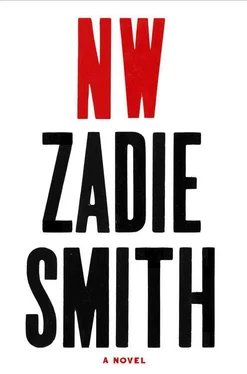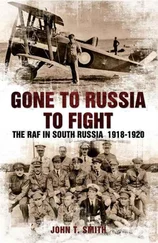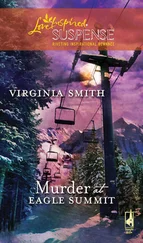Leah and Michel are left sitting in the grass, cross-legged, like children. This house makes her feel like a child. Cake ingredients and fancy rugs and throw cushions and upholstered chairs in chosen fabrics. Not a futon in sight. Overnight everyone has grown up. While she was becoming, everyone grew up and became.
— Why do you treat me like an idiot all the time?
— What?
— I ask you a question, Leah.
— I didn’t mean to. I just can’t stand him talking down to you like that.
— He didn’t. You did.
— Who is she? Who is this person? This bourgeois existence!
— Bourgeois, bourgeois, bourgeois. I think this is the only French word you know. You’ve become one of these English people… who hate all their friends.
Frank re-emerges through the French doors. If Frank were more observant he might catch them in their Punch and Judy mode, frozen in attitudes of disgust and fury. But Frank is not terribly observant, and by the time he looks up they are what they always seem to be: a happy couple in love.
— Do you know where the lead is?
Behind him, Nat strides back out, looking serene, unreadable. Naomi is hitched up on her hip like the baby she was not too long ago. Her wild afro curls shoot out in a million directions. Leah observes Michel staring at the child. He has an expression of deep longing on his face.
— Auntie Leah! Auntie Leah! Mummy says SLOW DOWN.
Leah stops, looks back. There is no-one and then round a corner Nat appears, sighing dramatically. The buggy is empty, Spike is in her arms, Naomi is tugging at her t-shirt. Gulliver, about to be pinned to the ground by Lilliputians.
— Lee, you sure this is right? Doesn’t look right.
— End of this road. On the map it sort of winds round and back on itself. Pauline said it’s hard to find.
— I can see the magistrates’ court and… a roundabout? Kids, stay close, stay in. It’s like walking the hard shoulder on the motorway. Nightmare. Kennedy Fried Chicken. Polish Bar and Pool. Euphoria Massage. Glad we took the scenic route. This can’t still be Willesden. Feels like we’re in Neasden already.
— The church it what makes it Willesden. It marks the parish of Willesden.
— Yeah but where is it? How does Pauline even get here?
— Bus, I spose. I dunno.
— Nightmare.
The road winds. They find themselves on a thin strip of pavement with a bollard at the end, clutching the children as the cars zoom by either side. To their right a foreclosed shopping arcade and a misconceived office block, empty, every other window broken. To their left, a grassy island nestled beside a dual carriageway. Intended as a green oasis, it is a fly-tipping zone. A water-logged mattress. An upturned sofa with ripped cushions, foully stained. More eccentric items, suggesting lives abandoned in a hurry: half a scooter, a decapitated Anglepoise, a car door, a hat stand, enough rolled-up lino for a bathroom floor.
In a pause between cars they run as one animal across the wide road, and then release each other, panting, hands on knees. Advised to “take it easy” for forty-eight hours, Leah feels a lightness in her head. She turns away, lifting her head slowly, and spots it first: an ancient crenellation and spire, just visible through the branches of a towering ash. Another twenty yards and the full improbability of the scene is revealed. A little country church, a medieval country church, stranded on this half acre, in the middle of a roundabout. Out of time, out of place. A force field of serenity surrounds it. A cherry tree at the east window. A low encircling brick wall marks the ancient boundary, no more a defense than a ring of daisies. The family vaults have their doors kicked in. Many brightly tagged gravestones. Leah and Nat and the children pass through the lych-gate and pause under the bell tower. Blue clockface brilliant in the sun. It is eleven thirty in the morning, in another century, another England. Nat uses the baby’s muslin to wipe her forehead of sweat. The children, till now raucous and complaining in the heat, turn quiet. A path threads through the shady graveyard, the Victorian stones marking only the most recent layer of the dead. Natalie maneuvers the buggy over uneven ground.
— Crazy. Never seen it before. Must have driven by hundreds of times. Lee, you got that thing of water? Probably why Pauline likes it. Cos it’s so old. Because you can be surer of the old ones.
Leah folds her arms flat across her bust and becomes her mother, assumes her mother’s face: mouth drawn downwards, eyelids fluttering against the world’s specks and their determination to fly into Pauline’s eyes. Natalie, mid-glug, laughs violently, spreading water down her front.
— I wouldn’t be liking the newer churches, no. I wouldn’t be dying over them. You can be surer of the older ones, so you can.
— Stop it — I’m going to choke. I lived here my whole life I never knew this place even existed. All those years stuck with Marcia in that Pentecostal tin-can when we could have been here. Keisha, hear me now. I just want the spirit of the Lord to settle upon us all.
They can ridicule their mothers but they can’t break the somber spell of this place. The children step gingerly between graves, they want to know if there are really and truly dead people underfoot. Leah speeds up, abandoning the path and tramping into high grass, leaving Nat equivocating with her brood upon the difference between the recently dead and the long dead. Leah stretches her arms out either side of herself. Her fingers brush the tops of the taller monuments, a broken stone urn, a crumbling cross. Soon she is behind the church. The alien past crowds round, partially legible on worn stones set at disappointed angles. Child death and lethal confinements. War and disease. Massive tablets covered in ivy, in lichen, in spots of yellow mold and moss.
Emily W___ of this parish was taken from this life in her thirty ____ year of life
In the year of our Lord eighteen ____ seven
Leaving behind six children and a husband Albert
Who joined her soon after in this ______
Marion _____ of this pari__
Died 17th December 1878 aged 2_ years
And also of Dora, infant daug__ of the above
Died 11th December 1878
Take it easy for forty-eight hours.
In this terrible sun.
Take it easy, Leah Hanwell of this parish.
Only daughter of Colin Hanwell, also of this parish.
Take it easy for the rest of your life.
Leah leans against a stone tall as herself. Here are three figures in haut relief, almost entirely effaced. She fits her fingers into the mossy grooves. A lady in gathered skirts is clutching something to her body, a featureless lump, something she has been given, maybe, and two young boys in frock coats reach out for her on either side. She is no one. Time has eaten away all detail: no name no date no face no knees no feet no explanation of the mysterious gift—
— Lee, you all right?
— Hot. It’s so hot.
They pass through a pair of heavy wooden doors to the interior. A service is just finishing. The queer incense smell of high church lingers. They walk round the perimeter and avoid the eyes of the faithful. Deliciously cool in here, better than air conditioning. Natalie picks up a leaflet. Congenital autodidact, always wanting to know. It must have been that break. The break made the difference. She became Natalie Blake in that brief pause in their long history, between sixteen and eighteen. Educated herself on the floor of Kensal Rise Library while Leah smoked weed all the live-long day. Natalie always picks up the leaflets, the leaflets and everything else.
— Parish founded in 938… nothing of the original church remains… present church dates from around 1315… Cromwellian bullet holes in the door, original…
Читать дальше











